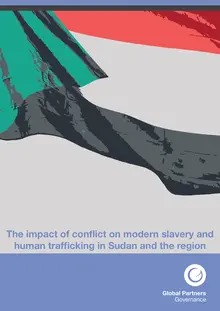The Impact of Conflict on Modern Slavery and Human Trafficking in Sudan, the Region

OCHA
On 15 April 2023, conflict erupted in Sudan between the Sudanese Armed Forces (SAF) and the militia of the Rapid Support Forces (RSF). Since then, intense clashes have continued between the warring forces across several states in the country. This resulted in the forced displacement of 8.4 million people, including 6.5 million internally and 1.9 million in neighbouring countries.
Due to its geographical location at the heart of a key route from East Africa to North Africa and Europe, Sudan has long been recognised as an origin, transit, and destination country for victims of modern slavery and human trafficking (MSHT).
However, the specific nature of the conflict and the mass displacement it has caused have led to the recording of increased rates of violence, including the use of sexual violence as a weapon of war and mass killings based on ethnic division. Combined, these circumstances lead to heightened vulnerability to various forms of MSHT, especially among internally displaced people (IDPs) or refugees, both in Sudan and its neighbouring countries.
This report seeks to map these MSHT trends in real time as the conflict continues to progress. While service delivery deteriorated as a result of the conflict, key challenges already existed in addressing MSHT. Those reflect significant funding and capacity gaps, as well as a lack of incentives at various levels of government and the complicity of some security actors in smuggling and trafficking itself.
Since the start of the conflict, the set of risk factors for potential victims have increased. The conflict itself has magnified risks of forced marriage and forced conscription, which mirrors similar patterns from previous conflict in Sudan. The high numbers of displaced people have also created turbulent conditions in which vulnerable groups lack access to safe shelter and are more likely to be exploited by traffickers.
Within these broad factors, specific groups present vulnerabilities. For example, Sudan has historically absorbed high numbers of refugees from neighbouring countries (such as South Sudan, Ethiopia and Eritrea) who are especially vulnerable to exploitation through MSHT because of historic discrimination, uncertain legal status, and pre-existing marginalisation. Women and girls have been particularly at risk of experiencing sexual exploitation through forced marriages, child marriages, and kidnapping. Men and boys have been more vulnerable to forced conscription and forced labour by armed forces, as well as forms of sexual violence. They have faced visa restrictions in travelling to neighbouring countries, during which they experienced heightened vulnerability from lack of protection and shelter.
The conflict has resulted in the complete breakdown of state institutions, including those responsible for upholding law and order. In some (more stable) states, local government has sought to cover aspects of federal government roles. Overall, however, capacity to respond to victims of MSHT or to take action against perpetrators is significantly reduced. There are no dedicated service providers that can provide the range of services needed to support victims. The quality of services still offered has been significantly impacted by the conflict. Moreover, notable stigma and social barriers remain for victims to come forward and ask for support, in particular for those who have experienced sexual violence or exploitation.



